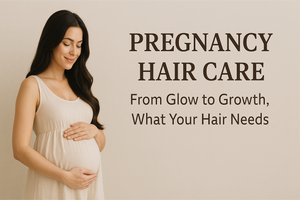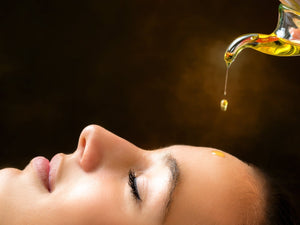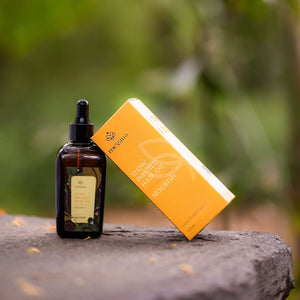I bet you're still basking in that delightful postpartum glow, holding your bundle of joy in your arms. The wait of all those long months was undoubtedly worth it, and the pleasure of bringing a new life into the world is a truly miraculous journey. Yet, amidst the sweet cuddles and sleepless nights, reality often surprises new moms in the form of postpartum changes!
Today, we're diving into one such post-pregnancy change that resonates deeply with countless mothers: postpartum alopecia. Forget the glow, forget the joy; let's talk briefly about the unexpected shedding and changes that leave you staring at the mirror, wondering, "What happened to my hair?"
This blog is about understanding these changes in your hair health after pregnancy and unravelling the secrets to help transform your locks during this transformative phase. So, grab a cup of tea or coffee (or a moment of peace), and let's focus on understanding postpartum hair loss and how to manage it.
What Causes Postpartum Hair Loss

The period of pregnancy is associated with many hormonal changes in a woman's body, the most significant being the constantly elevated levels of estrogen and progesterone! These hormones help maintain a healthy pregnancy, but their role is not limited to that. They also impact hair growth significantly. Increased estrogen prolongs the growth phase of the hair growth cycle, resulting in thicker, healthier, and more luscious locks during pregnancy. However, as soon as the pregnancy ends, the body undergoes a significant hormonal shift, often leading to postpartum hair fall. This temporary hair loss is a common experience as the effect of pregnancy hormones begins to decline.
Influence of pregnancy on different phases of hair growth:
Understanding the hair growth cycle and how it is affected by various changes is essential to understanding post-pregnancy hair changes.
The hair growth cycle consists of three phases:
- Anagen (growth phase),
- Catagen (transitional phase), and
- Telogen (resting phase).
We already know that the growth phase is prolonged due to the influence of estrogen during pregnancy. However, as the estrogen levels plummet after childbirth, the hair soon starts to transition into the transitional and resting phases, causing a noticeable shift in hair thickness and texture!
Signs Of Postpartum Hair Loss
Shedding and thinning of hair:
- It is one of the most common post-pregnancy hair changes, often called telogen effluvium.
- The prolonged growth phase in pregnancy forces hair follicles to go into the resting phase after childbirth, causing extreme hair shedding and thinning.
- This is a temporary phase; most women regain their average hair density within a few months.
Changes in hair texture:
- Some women may notice changes in the texture of their hair postpartum.
- Hair may become finer or coarser.
- There might be alterations in curl patterns.
- These changes are a result of hormonal fluctuations and are usually temporary.
Postpartum alopecia:
- Postpartum alopecia is a type of hair loss that occurs specifically after childbirth.
- It is most commonly experienced around three to four months postpartum.
- This condition is a normal response to hormonal changes and usually resolves independently within a few months.
How Long Does Postpartum Hair Loss Last?
Postpartum hair thinning typically peaks around 3 to 5 months after childbirth and can last anywhere from 6 to 12 months. During this period, hormonal fluctuations lead to increased shedding, which can be distressing for many women.
Establishing a gentle hair care routine is crucial to managing postpartum hair fall effectively. Opt for nourishing shampoos and conditioners that promote scalp health and minimise the use of heat styling tools to prevent further damage. A balanced diet rich in vitamins and minerals can also support healthy hair regrowth.
While most women see their hair return to its pre-pregnancy state within a year, some may experience prolonged shedding. If excessive hair loss continues beyond this timeframe, it’s advisable to consult a healthcare provider to rule out any underlying issues. Patience and proper care are vital to navigating this transition!
How to Stop Postpartum Hair Loss?
Experiencing postpartum hair thinning can be overwhelming, but you can promote healthy regrowth with the right approach. Here are seven practical tips to manage and minimise postpartum hair fall:
Healthy Diet: Focus on consuming whole, nutritious foods while avoiding processed and junk options. Incorporate plenty of vegetables, fruits, and leafy greens to support healthy hair growth.
Nutritional Supplement: Sometimes, it's challenging to get all necessary nutrients from food alone. Stay consistent with supplements prescribed by your doctor to help combat hair fall and promote regrowth.
Reduce Stress: High stress levels can contribute to hair loss. Engage in relaxation techniques like yoga or meditation to minimise stress and encourage healthier hair growth.
Change Hairstyle: Experimenting with different hairstyles can create the illusion of more volume. Find styles that suit you while gently wearing your hair to prevent further damage.
Change Hair Care Routine: Seek out shampoos, conditioners, and oils that promote hair growth. Treat your hair with extra care to enhance its health and vitality.
Go Natural: Reduce the use of harsh chemicals in hair products. Opt for natural alternatives that are less likely to cause damage and contribute to hair fall.
Be Patient: After implementing these changes, patience is vital. It may take several months to see significant results, so stay committed to your routine for the best outcome.
Hair care tips for women post-pregnancy
A well-rounded hair care routine is essential for new mothers experiencing postpartum hair fall. Incorporating natural remedies and nourishing treatments can help restore hair health and minimise shedding. Here are some practical tips to enhance your hair care regimen:
Bhringraj Oil Massage:
Warm Bhringraj oil and gently massage it into your scalp. Leave it on for at least 30 minutes before washing it off with a mild shampoo.
Amla and Shikakai Hair Mask:

Create a hair mask by mixing amla and shikakai powder with water to form a paste. Apply this mixture to your hair and scalp, leave it on for 30-45 minutes, and then wash it off with lukewarm water.
Methi Seed Paste:
Soak a handful of methi seeds overnight, grind them to make a paste, and apply it to your scalp. Leave it on for about 30 minutes before washing it off.
Aloe Vera Gel:
Apply fresh aloe vera gel to your scalp and hair.
Hibiscus Flower and Leaf Paste:
Make a paste using hibiscus flowers and leaves. Apply this paste to your hair and scalp, leave it on for 30 minutes, and wash it off.
Coconut and Curry Leaf Infusion:
Boil curry leaves in coconut oil until they become roasted. Strain the oil and apply it to your hair.
Triphala Hair Rinse:
Prepare a Triphala decoction by boiling Triphala powder in water. After cooling, use it as a hair rinse after shampooing.
Amla and Yogurt Hair Mask:
Mix amla powder with yoghurt to create a hair mask. Apply it to your hair and scalp, leave it on for 30 minutes, and wash it off.
Neem Oil Treatment:
Neem oil is known for its antibacterial and antifungal properties. Apply neem oil to your scalp and hair, leave it on for a few hours or overnight, then wash it off.
Sesame Oil and Methi Seed Infusion:
Boil methi seeds in sesame oil and let it cool. Apply this infused oil to your hair and scalp, leave it on for a few hours, and wash it off.
Conclusion
Postpartum hair loss can be a surprising challenge for new mothers, but understanding its causes and solutions can make a significant difference. At MeVana, we recognise that every individual's hair journey is unique.
Our personalised approach begins with a detailed analysis of your lifestyle and health factors, allowing us to create custom Ayurvedic blends tailored to your needs. You can effectively address postpartum hair thinning by incorporating MeVana’s targeted hair care solutions into your routine.
With our Dinacharya card and customised regimens, we combine ancient wisdom with modern innovation to support your hair's recovery. Remember, with the proper care and patience, you can restore your hair's health and confidence during this transformative time.






